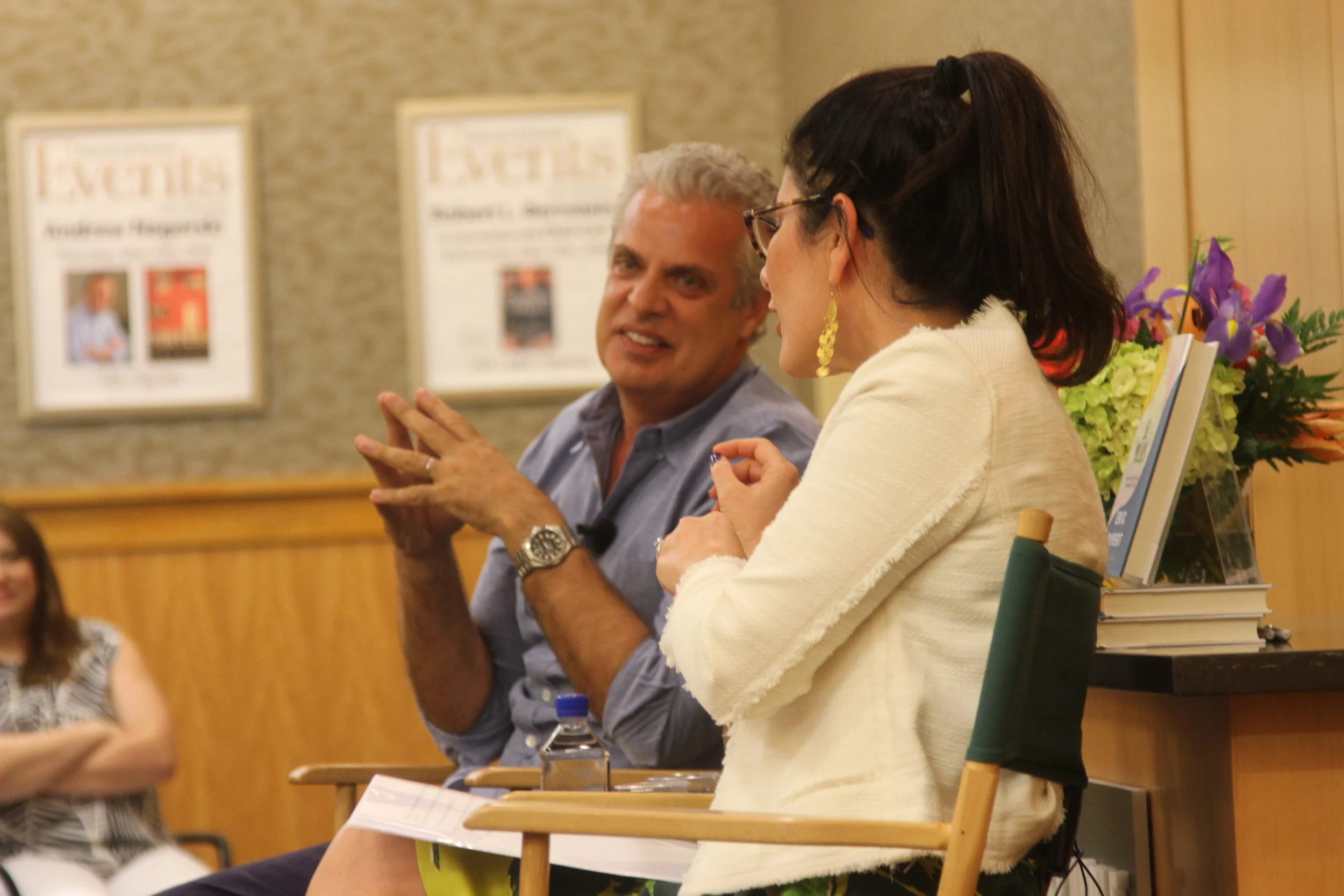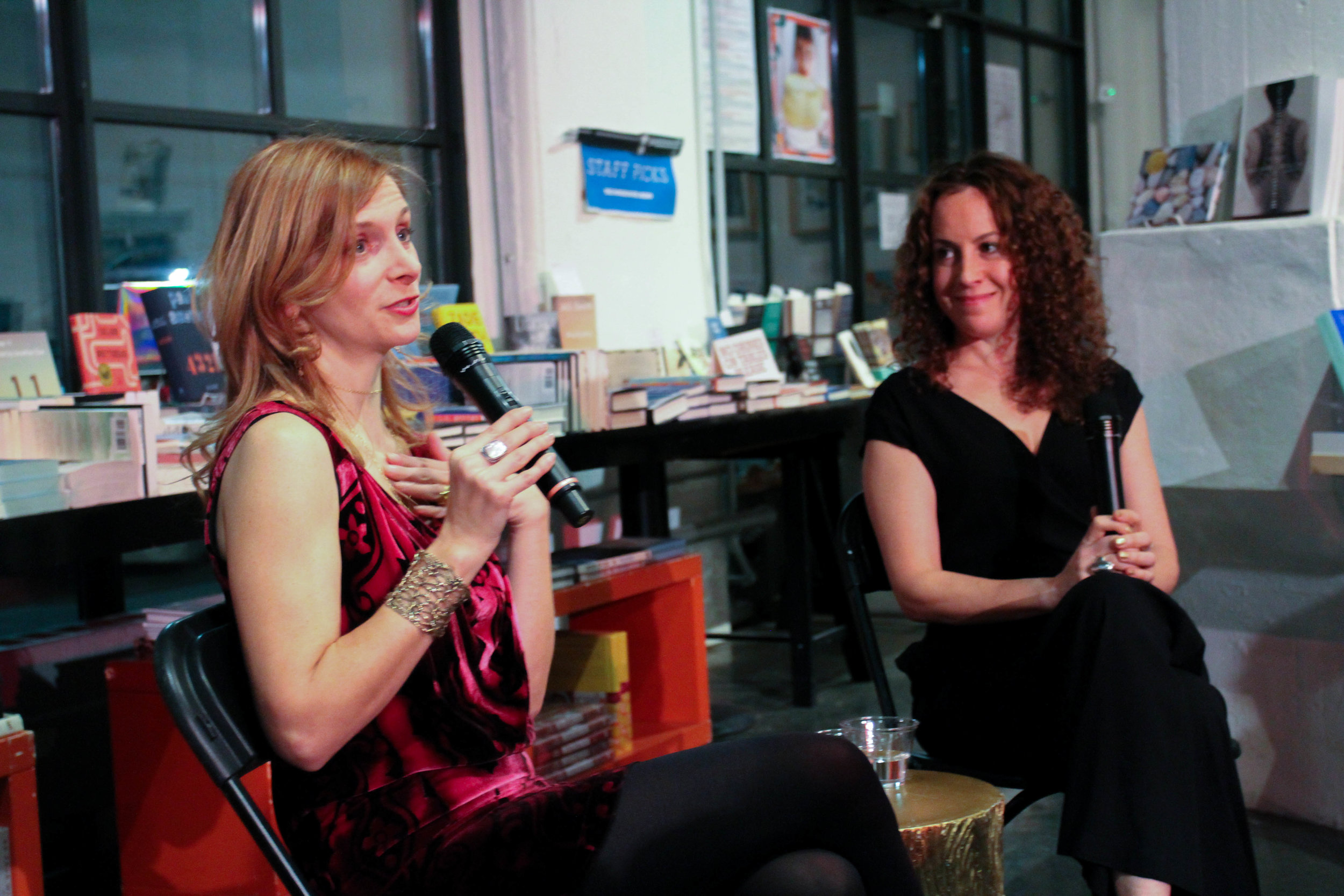Natalie Eve Garrett, Lev Grossman & more @ Powerhouse Books
Natalie Eve Garrett presented The Artists and Writers Cookbook at Powerhouse Books, in conversation with Lev Grossman and Elissa Schappell, who both read their contributions. The conversation was moderated by Porochista Khakpour.
The cookbook was inspired by a 1961 book of the same name, and was conceived of and edited by Garrett. It contains recipes and stories from 76 novelists, poets, painters, illustrators and more, in many forms. “Some people went right to recipes, some submitted things you can’t make, like Stone Soup, there’s a poem, there are some more narrative sections…” While the original book was very recipe-focused, some without even introductions, Garrett wanted her modern take to lean on the anecdotes behind the food – when she approached people, “my lone requirement was that they had to include a story.”
She found the original at a complicated time in her life – she was home with her child, while also trying to write, publish, paint and cook. “It was like a secret portal into the worlds of these artists. Odd, unexpected, charming, and big-hearted. When I saw it, it was like all of my creative interests coming together, it encapsulated everything that I love. Like my ideal answer to that interview question of who I’d want to have at my fantasy dinner party.” She decided to write an updated version and reached out to artists that she liked, balancing people from all over the world and the USA to build a range of perspectives and cooking styles.
Grossman was one who was excited to get the call. “I feel like I’d been waiting for someone to ask – I had that story ready for this question and if no one had asked it, I might have died without telling it.” His story, Seared Scallops with Béarnaise Sauce and a New Life, tells a reader both how to make the titular dish and how to create a new, happier life for yourself through cooking and self-care. Not bad for 2-3 pages. And it’s not his usual fiction – he says he cooks every day, even though he grew up in a Midwestern household where it wasn’t much of a concern. “My two talents are writing and cooking. All of the senses that have been offline all day while I write come rushing back. And food is gone in 15 minutes, it just sort of happens in the moment and you enjoy it and then it goes away. Whereas a book lasts forever.”
Schappell also cooks every day but less enthusiastically. “My mom was a caterer, so she taught me things like pate and fondue. I’m great at the beginning of the meal, but less interested in the main course, and I can’t bake. I make what I like to eat, I’m terrible at math, I don’t like people telling me what to do and I think I know better!” As any baker knows, this is not a recipe for perfectly turned out, consistent cakes. “I grew up thinking that birthday cakes always had the bottoms cut off, or a ring of plants around them. But they tasted wonderful, it was all love.” Her addition to the book, Conqueror’s Canapés, are more in her comfort zone and come from a recipe that her mother used to make her father for his birthday every year. Another thing that she learned from her mother was “never to apologize for your food – pick your chin up and say, ‘this is how they do it in France!’”
Does creativity in the arts necessarily make one creative in the kitchen? While that was posited by the original book, Garrett found differently. “I think that’s a weird glamorization of creative people. But everyone has wonderful stories to tell, and everyone has some relationship with food.”
Even the titles of the recipes are evocative and unique – in addition to the above, you’ll find Kamrooz Aram’s The Distinctive Melancholy of Ghorem Sabzi, or Joyce Carol Oates’ Recipe in Defiance of Grief. “What people choose really reveals their character,” said Khakpour. “It’s a roundabout way of getting artists to reveal themselves organically. Like a collective memoir.”
But writing well and cooking well don’t lead one to success in food writing. “My characters never eat. I just kind of fast forward through the experience because it’s so hard to write about,” said Grossman. The other writers concurred, although James Salter was mentioned as someone who writes both food and sex scenes in interestingly.
A last parallel between cooking and writing is the inherent anxiety in presenting something you’ve made for the reaction of others, although curiously the writers agreed that they found it much easier to do with their writing than with food. The thing about writing, though, is that a writer can just throw it down and run out; they’re rarely in the same room as someone who is reading their book. With cooking, it’s a much more immediate reaction, often unavoidable. “But if it comes from a place of love and generosity, that’s all you can do,” said Schappell, who knows firsthand the pain of a rejected offering, thanks to her picky teenager. “It’s like, I just want to feed you! It is personal, it’s a gift.”







